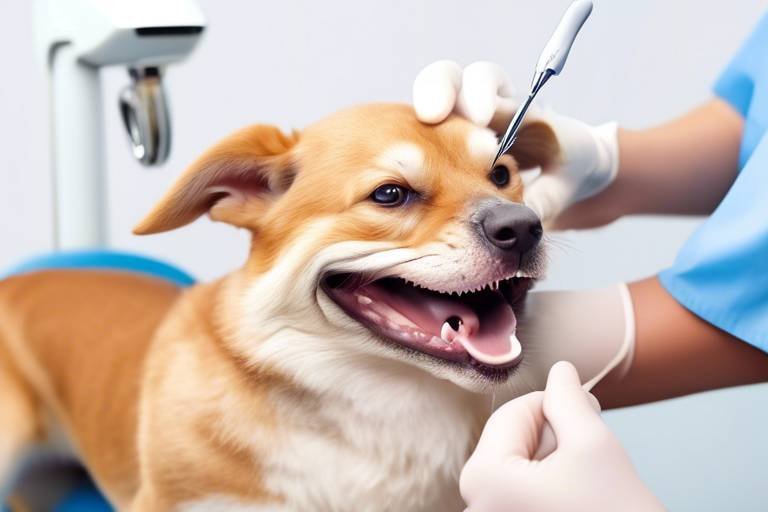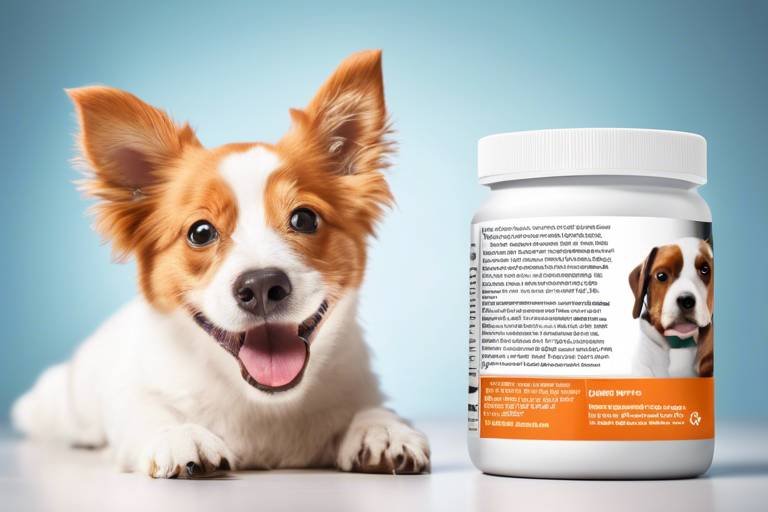Understanding the Impact of Diet on Pet Behavior
Have you ever noticed how your furry friend seems to bounce off the walls after a hearty meal, or perhaps they curl up in a corner, seemingly uninterested in the world around them? Diet plays a critical role in shaping not only the physical health of pets but also their behavior and emotional well-being. It’s fascinating how the food we provide can influence their mood, energy levels, and even their interactions with us and other animals. Just like humans, pets require a balanced diet to function optimally, and the right nutrition can lead to a happier, more well-adjusted pet.
When we think about pet nutrition, we often focus on the basics—protein, carbohydrates, fats, vitamins, and minerals. But what if I told you that the right combination of these nutrients can make a significant difference in your pet's behavior? For example, a diet rich in omega fatty acids can help reduce anxiety and promote a calm demeanor, while a lack of essential nutrients might lead to irritability and hyperactivity. Understanding what goes into your pet's bowl can be the first step towards a more harmonious household.
Moreover, the relationship between diet and behavior isn't just about what pets eat; it’s also about how they react to their food. Some pets may have food sensitivities or allergies that manifest not only physically but also behaviorally. Imagine a dog that becomes agitated or aggressive after consuming a certain ingredient. This connection highlights the importance of being attentive to changes in behavior that may correlate with dietary changes.
As pet owners, we have the unique opportunity to set our pets up for success through informed dietary choices. By understanding the impact of their diet, we can create an environment that fosters positive behavior. Think of nutrition as the foundation of a house; without a solid base, everything else is at risk. So, let’s dive deeper into how we can optimize our pets' diets to enhance their behavior and overall quality of life.
Understanding the fundamentals of pet nutrition is crucial for pet owners. This section discusses essential nutrients, dietary requirements, and how they affect overall health and behavior in pets.
Many pets suffer from dietary issues that can lead to behavioral problems. This section covers common issues such as obesity, food allergies, and nutritional deficiencies that can negatively impact pet behavior.
Obesity in pets can lead to lethargy and aggression. This subheading delves into how excess weight affects energy levels and behavior, along with tips on managing a healthy weight for pets.
Recognizing the signs of obesity in pets is vital for timely intervention. This section outlines physical indicators and behaviors that suggest a pet may be overweight.
Effective weight management strategies are essential for improving pet behavior. This subheading discusses diet modifications, exercise routines, and behavioral training to help pets achieve and maintain a healthy weight.
Food allergies can lead to significant changes in a pet's behavior. This section explains how allergic reactions can manifest in pets and the importance of identifying and eliminating allergens from their diet.
Supplements can play a vital role in enhancing pet behavior. This section explores various supplements, such as omega fatty acids and probiotics, and their effects on mood, anxiety, and overall behavior.
Selecting appropriate supplements for pets requires careful consideration. This subheading provides guidance on how to choose the right supplements based on a pet's specific needs and health conditions.
Veterinary consultation is crucial when considering dietary changes or supplements. This section emphasizes the importance of professional advice to ensure the best outcomes for pet health and behavior.
- How can I tell if my pet's diet is affecting their behavior? Look for changes in energy levels, mood swings, or unusual reactions to certain foods.
- What are the signs of obesity in pets? Common signs include difficulty in movement, excessive panting, and a noticeable lack of interest in play.
- Are supplements necessary for all pets? Not necessarily; it depends on the individual pet's health needs. Always consult your veterinarian before adding supplements.
- Can changing my pet's diet improve their behavior? Yes, a balanced diet tailored to your pet's specific needs can lead to improvements in behavior and overall well-being.

The Science of Pet Nutrition
Understanding the fundamentals of pet nutrition is crucial for pet owners who want to ensure their furry friends lead happy and healthy lives. Just like humans, pets require a balanced diet that provides all the essential nutrients to thrive. But what exactly does that entail? Well, it all comes down to three main components: proteins, fats, and carbohydrates. Each of these macronutrients plays a unique role in a pet's overall health and behavior.
Proteins are the building blocks of life, essential for growth, maintenance, and repair of body tissues. They also play a critical role in the production of enzymes and hormones, which are vital for various bodily functions. When pets don't get enough protein, they may exhibit signs of lethargy or even aggression due to discomfort or illness. On the other hand, fats are a concentrated source of energy and are necessary for absorbing certain vitamins. Healthy fats, such as omega-3 and omega-6 fatty acids, can also support brain health and improve mood. Lastly, carbohydrates provide energy and aid in digestion. They help to keep your pet's gut healthy, which is essential for overall well-being.
But it doesn't stop there! Pets also need a variety of micronutrients, including vitamins and minerals, to support their immune systems and maintain optimal health. For instance, calcium and phosphorus are crucial for strong bones, while vitamins A, D, E, and K play essential roles in various bodily functions. Without these micronutrients, pets can develop health issues that may lead to changes in behavior. For example, a deficiency in B vitamins can lead to anxiety and irritability in dogs.
It's also important to consider the specific dietary requirements based on a pet's age, breed, and health condition. For instance, puppies require more protein and calories compared to adult dogs, while senior pets may benefit from diets lower in calories but higher in fiber to aid digestion. Understanding these unique needs can make a world of difference in your pet's behavior and overall happiness.
Interestingly, the way we feed our pets can also impact their behavior. Feeding routines, portion sizes, and even the type of food can influence how pets feel. For example, a dog fed on a strict schedule may become anxious if meals are delayed, while free-feeding may lead to overeating and subsequent behavioral issues. Hence, it's essential to find a dietary approach that suits both the nutritional needs and behavioral tendencies of your pet.
In conclusion, a well-rounded understanding of pet nutrition is not just about what goes into the bowl; it's about recognizing how those choices affect your pet's physical and mental well-being. By prioritizing a balanced diet rich in essential nutrients, pet owners can significantly enhance their pets' quality of life and promote positive behaviors.
- What are the essential nutrients my pet needs? Pets require proteins, fats, carbohydrates, vitamins, and minerals to maintain their health.
- How can I tell if my pet is getting a balanced diet? Look for signs of good health, such as a shiny coat, healthy weight, and high energy levels. Consulting with a veterinarian can also help.
- Can diet really affect my pet's behavior? Absolutely! Nutrition plays a vital role in a pet's mood and behavior, influencing everything from energy levels to anxiety.

Common Dietary Issues in Pets
When it comes to our furry friends, their diet is not just about filling their bellies; it plays a pivotal role in their overall behavior and well-being. Many pet owners may not realize that dietary issues can lead to significant behavioral problems in pets. Just like humans, pets can suffer from a range of dietary-related issues that can affect their mood, energy levels, and even their temperament. Understanding these common dietary issues is crucial for any pet owner who wants to ensure their pet is happy and healthy.
One of the most prevalent issues is obesity. This condition occurs when pets consume more calories than they expend, leading to excess weight. Obesity can cause lethargy, making pets less active and more prone to behavioral problems such as aggression or irritability. Imagine feeling weighed down by extra pounds; it can make anyone grumpy! Unfortunately, many pet owners are unaware of their pet's weight, which is why regular check-ups and monitoring are essential.
Another significant concern is food allergies. Pets can develop allergies to certain ingredients in their food, leading to discomfort and behavioral changes. For instance, a pet with a food allergy may experience itching or gastrointestinal distress, which can make them irritable and anxious. Identifying allergens can be tricky, but it often involves trial and error with different diets. If your pet seems unusually restless or moody, it might be time to investigate their food.
Nutritional deficiencies are yet another issue that can impact pet behavior. Just like a car needs the right fuel to run smoothly, pets require a balanced diet to function optimally. If they are missing essential nutrients—such as vitamins, minerals, or proteins—it can lead to a host of problems, including poor coat condition, low energy levels, and behavioral issues. For instance, a lack of certain B vitamins can lead to anxiety and restlessness in pets. To help combat these deficiencies, pet owners should consult with a veterinarian to determine the best diet for their furry companions.
| Dietary Issue | Behavioral Consequences |
|---|---|
| Obesity | Lethargy, aggression, irritability |
| Food Allergies | Itching, anxiety, irritability |
| Nutritional Deficiencies | Low energy, anxiety, poor coat condition |
In summary, being aware of these common dietary issues can empower pet owners to make informed decisions about their pets' diets. It’s not just about what goes into their bowls; it’s about ensuring that our beloved pets have the right balance of nutrients to thrive. By recognizing the signs of these dietary issues, pet owners can take proactive steps to improve their pets' diets, ultimately leading to happier, healthier, and more well-behaved companions.
- How can I tell if my pet is overweight? Look for signs such as difficulty feeling their ribs, lack of a defined waist, and decreased energy levels.
- What are common signs of food allergies in pets? Symptoms may include itching, gastrointestinal upset, and behavioral changes like irritability or anxiety.
- Should I consult a veterinarian about my pet's diet? Yes, consulting a veterinarian is crucial for personalized dietary advice and to address any specific health concerns.
Obesity and Its Behavioral Consequences
Obesity is not just a physical condition; it can significantly alter the behavior of our beloved pets. When a pet becomes overweight, the excess weight can lead to a cascade of issues that affect their mood, energy levels, and overall behavior. Imagine trying to run a marathon while carrying an extra backpack filled with rocks—this is what our pets experience when they are overweight. Their bodies struggle, and as a result, their behavior often changes.
One of the most noticeable effects of obesity is lethargy. Pets that carry extra weight tend to be less active, preferring to lounge around instead of engaging in play or exercise. This lack of activity can lead to boredom, which may manifest in destructive behaviors such as chewing furniture or excessive barking. Additionally, an overweight pet may become more irritable and less tolerant of handling or interaction, leading to a decrease in the quality of the human-animal bond.
On the flip side, obesity can also lead to increased aggression in some pets. When a pet feels uncomfortable in its own body, it may react defensively to perceived threats, which can include other pets, strangers, or even family members. This change in behavior can be alarming for pet owners who may not immediately connect the dots between their pet's weight and its temperament. It's crucial to recognize that these behavioral changes are often a cry for help, indicating that the pet may be struggling with its weight.
To understand the full scope of how obesity impacts pet behavior, let's take a look at some key behavioral changes associated with overweight pets:
- Lethargy: Reduced energy levels, leading to less play and exercise.
- Destructive Behavior: Chewing, scratching, or other forms of mischief due to boredom.
- Increased Aggression: Heightened defensiveness and irritability in social situations.
- Social Withdrawal: Avoiding interaction with humans or other pets.
Recognizing these signs is the first step towards addressing obesity in pets. If you notice any of these behavioral changes, it may be time to reevaluate your pet's diet and activity levels. The journey to a healthier weight can not only improve your pet's physical health but can also restore its joyful, playful spirit.
In conclusion, managing your pet's weight is not just about aesthetics; it's about enhancing their quality of life. By keeping your pet at a healthy weight, you can help them lead a more active, happy, and fulfilling life. Remember, a healthy pet is a happy pet!
Q: How can I tell if my pet is overweight?
A: Look for physical indicators such as difficulty feeling their ribs, a lack of a defined waist, and decreased energy levels. Consult with your veterinarian for a thorough assessment.
Q: What are some effective ways to manage my pet's weight?
A: Incorporate regular exercise, adjust their diet to include lower-calorie options, and consider portion control. Behavioral training can also help encourage more activity.
Q: Can obesity affect my pet's lifespan?
A: Yes, obesity can lead to various health issues such as diabetes, heart disease, and joint problems, which can ultimately shorten your pet's lifespan.
Q: Should I consult a veterinarian about my pet's weight?
A: Absolutely! A veterinarian can provide tailored advice and create a specific weight management plan based on your pet's individual needs.
Identifying Obesity in Pets
Recognizing obesity in pets is crucial for ensuring their health and happiness. Just like humans, pets can struggle with weight issues that not only affect their physical appearance but also their overall well-being. But how do you know if your furry friend is tipping the scales? It’s not just about looking at them; it’s about understanding their body condition and behaviors. One of the first signs to look for is the pet's body shape. Ideally, you should be able to feel their ribs without too much pressure. If you can’t feel them at all, it’s time to take a closer look at their diet and exercise habits.
Another important factor to consider is the pet's waistline. When you look down at your pet from above, there should be a noticeable waist between their ribs and hips. If you notice that your pet has a rounded shape without this indentation, it could be a sign of excess weight. Additionally, keep an eye out for any changes in their activity levels. Are they less enthusiastic about walks or playtime? Are they panting more than usual after light exercise? These behavioral changes can indicate that your pet is carrying extra weight.
It's also essential to monitor their eating habits. If your pet seems to be constantly begging for food or if they finish their meals in record time, it might be a sign that they are overeating. Sometimes, pets can become food-driven, leading to a cycle of unhealthy eating and weight gain. To help you identify obesity in your pet, consider the following physical indicators:
- Rib Check: Can you feel your pet's ribs easily?
- Waist Observation: Is there a noticeable waist when viewed from above?
- Energy Levels: Has your pet become less active or more lethargic?
- Behavioral Changes: Are they showing signs of increased irritability or aggression?
By keeping these indicators in mind and regularly assessing your pet's condition, you can catch obesity early and make necessary adjustments to their diet and lifestyle. Remember, a healthy pet is a happy pet, and maintaining their ideal weight is a key component of their overall health.
Q: How often should I check my pet's weight?
A: It's a good idea to weigh your pet at least once a month. Regular check-ins can help you notice any gradual changes in weight.
Q: What are some healthy snacks for my pet?
A: Instead of high-calorie treats, consider using fruits like apple slices (without seeds) or carrots. These can be great low-calorie alternatives!
Q: Can obesity in pets lead to other health issues?
A: Absolutely! Obesity can lead to a variety of health problems, including diabetes, joint issues, and heart disease. Keeping your pet at a healthy weight is essential for preventing these conditions.
Strategies for Weight Management
When it comes to keeping our furry friends healthy, weight management is not just a matter of aesthetics; it’s a crucial aspect of their overall well-being. Just like humans, pets can struggle with maintaining a healthy weight, which can lead to a host of behavioral and health issues. So, what can we do to help our pets shed those extra pounds and feel their best? Here are some effective strategies that can make a significant difference.
Firstly, diet modifications are essential. This doesn’t mean simply cutting down on food but rather ensuring that the food provided is nutritionally balanced. High-quality pet food that is specifically formulated for weight management can help pets feel full while consuming fewer calories. Look for options that list real meat as the first ingredient and are lower in carbohydrates. It’s also vital to measure food portions accurately. Many pet owners tend to underestimate how much they are feeding their pets, leading to unintentional overfeeding.
Next, exercise routines play a vital role in weight management. Just like us, pets need regular physical activity to burn calories and maintain a healthy weight. Engaging your pet in daily exercise can be as simple as taking them for walks, playing fetch, or even setting up an obstacle course in your backyard. The key is to make it fun! Not only does this help with weight loss, but it also strengthens the bond between you and your pet. Aim for at least 30 minutes of exercise a day, but remember to adjust the intensity based on your pet's age and physical condition.
Another important aspect is behavioral training. Sometimes, pets eat out of boredom or anxiety rather than hunger. Implementing training techniques to manage their behavior can reduce unnecessary snacking. Consider rewarding your pet with love and attention instead of treats. If you want to give them a little something special, opt for healthy snacks like carrot sticks or apple slices (without seeds). This not only satisfies their cravings but also contributes to their nutritional needs.
Lastly, it can be beneficial to keep a weight management journal. Tracking your pet’s food intake, exercise routines, and weight changes can provide valuable insights into what works and what doesn’t. This way, you can adjust your strategies accordingly and stay motivated. You might even want to share this journal with your veterinarian during check-ups to get professional advice tailored to your pet's specific needs.
In summary, managing your pet's weight involves a combination of proper diet, regular exercise, and behavioral training. By implementing these strategies, you can help your pet achieve and maintain a healthy weight, leading to a happier and more energetic companion.
- How can I tell if my pet is overweight? Look for signs such as difficulty in feeling their ribs, a lack of a defined waist, and lethargy. A visit to the vet can provide a more accurate assessment.
- Is it safe to put my pet on a diet? Yes, but it’s essential to consult with a veterinarian first to ensure the diet is appropriate for your pet’s age, breed, and health condition.
- What types of exercises are best for pets? Activities like walking, playing fetch, and agility training are excellent. Always consider your pet's physical limitations and preferences.
- How often should I feed my pet? It depends on their age and dietary needs. Generally, adult pets benefit from two meals a day, while puppies may need more frequent feeding.
Food Allergies and Behavioral Changes
Food allergies in pets are more common than many pet owners realize, and they can lead to significant changes in a pet's behavior. Just like humans, pets can develop allergies to certain ingredients in their food, which can trigger a range of physical and psychological responses. Imagine feeling itchy and uncomfortable all the time; that’s what your furry friend might be experiencing. These allergies can manifest in various ways, including skin irritations, gastrointestinal upset, and even behavioral shifts.
When a pet suffers from food allergies, they may experience symptoms such as excessive scratching, biting at their skin, or gastrointestinal distress, which can lead to anxiety and irritability. For instance, a dog that is normally playful may become withdrawn and less active due to discomfort. Similarly, a cat might display aggression or increased hiding behavior as a response to the stress caused by their allergic reactions. This change in demeanor can be confusing for pet owners, who may not immediately connect the dots between diet and behavior.
Identifying food allergies can be a bit of a detective game. It often requires keeping a close eye on your pet's diet and behavior. Common allergens include:
- Beef
- Dairy
- Wheat
- Chicken
- Fish
When these ingredients are present in your pet’s diet, they may experience discomfort that can lead to changes in behavior. For example, a dog that is allergic to chicken might not only suffer from digestive issues but could also become more aggressive or anxious due to ongoing discomfort. Understanding this connection is crucial for pet owners who want to ensure their pets are both happy and healthy.
To address food allergies effectively, it’s important to consult with a veterinarian. They can help in diagnosing allergies through elimination diets or allergy testing. Once the allergen is identified, the next step is to eliminate it from your pet's diet. This might mean switching to a hypoallergenic diet or one that is free from common allergens. Additionally, incorporating supplements such as omega fatty acids can help reduce inflammation and improve skin health, which in turn may alleviate some behavioral issues associated with discomfort.
In summary, food allergies can significantly impact a pet's behavior, leading to anxiety, aggression, or withdrawal. By being vigilant about your pet's diet and seeking professional guidance, you can help your furry friend feel better both physically and emotionally.
- What are the signs of food allergies in pets?
Look for symptoms such as itching, excessive licking, gastrointestinal upset, and changes in behavior. - How can I determine if my pet has a food allergy?
A veterinarian can help diagnose food allergies through elimination diets or allergy testing. - What should I do if I suspect my pet has a food allergy?
Consult with your veterinarian for a proper diagnosis and dietary recommendations. - Can food allergies cause behavioral changes in pets?
Yes, discomfort from food allergies can lead to anxiety, aggression, or withdrawal behaviors.

The Role of Supplements in Pet Behavior
When it comes to our furry friends, nutrition plays a pivotal role in their overall health and behavior. Just like humans, pets can benefit immensely from dietary supplements that target specific needs. These supplements can help in enhancing mood, reducing anxiety, and even improving cognitive function. Imagine a dog that used to bark incessantly when left alone suddenly becoming calm and relaxed after incorporating a few key supplements into its diet. That’s the kind of transformation we’re talking about!
One of the most popular supplements for pets is omega fatty acids. These essential fats are not only great for promoting a shiny coat but also for supporting brain health. Studies have shown that omega-3 fatty acids can help reduce signs of anxiety and aggression in pets. For instance, a cat that used to hide whenever company came over may start to feel more at ease and even come out to socialize. Isn’t that a wonderful change?
Another supplement worth mentioning is probiotics. These beneficial bacteria can do wonders for your pet's digestive health, which is closely linked to their overall well-being. A healthy gut can lead to a happier pet, and it can even affect their behavior. For example, if your dog has been experiencing digestive issues, it might also exhibit signs of irritability or discomfort. By incorporating probiotics into their diet, you might just see a more relaxed and content companion.
| Supplement | Benefits |
|---|---|
| Omega Fatty Acids | Improves coat health, reduces anxiety and aggression |
| Probiotics | Enhances digestive health, promotes overall well-being |
| Calming Aids | Reduces stress and anxiety during stressful situations |
However, it’s essential to approach the use of supplements with caution. Not all supplements are created equal, and what works for one pet might not work for another. Therefore, it’s crucial to choose the right supplements based on your pet's individual needs. Always look for high-quality products from reputable brands and consider your pet's specific health conditions before introducing anything new into their diet.
Moreover, consulting with a veterinarian is a must when considering dietary changes or supplements for your pet. A vet can provide tailored advice that takes into account your pet's unique health profile, ensuring that you make informed decisions that will benefit their behavior and overall health. After all, you wouldn’t want to give your pet something that could do more harm than good, right?
In conclusion, supplements can play a vital role in enhancing your pet's behavior and well-being. By understanding the specific benefits of various supplements and consulting with your veterinarian, you can make informed choices that lead to a happier, healthier pet.
- What are the most common supplements for pets? Omega fatty acids, probiotics, and calming aids are among the most popular.
- How do I know if my pet needs supplements? Consult with your veterinarian to assess your pet's diet and health needs.
- Can supplements replace a balanced diet? No, supplements should complement a balanced diet, not replace it.
Choosing the Right Supplements
When it comes to enhancing your pet's behavior through supplements, choosing the right ones can feel like navigating a maze. With so many options available, how do you know which supplements are truly beneficial for your furry friend? First and foremost, it's essential to understand that not all supplements are created equal. Each pet is unique, and their nutritional needs can vary based on factors like age, breed, health conditions, and lifestyle. This is where careful consideration comes into play.
One of the first steps in selecting the right supplements is to identify your pet's specific needs. For instance, if your pet exhibits signs of anxiety or stress, you might want to consider supplements that contain omega fatty acids or L-theanine, known for their calming properties. On the other hand, if your pet struggles with digestive issues, probiotics could be the answer to restoring balance in their gut. Understanding the symptoms your pet displays can guide you toward the appropriate supplements.
Another vital aspect to consider is the quality of the supplements. Not all products on the market adhere to the same manufacturing standards, which can affect their efficacy. Look for brands that provide transparency in their ingredients and sourcing. Ideally, choose supplements that have undergone third-party testing to ensure they contain what they claim without harmful additives. A good rule of thumb is to read reviews and consult with fellow pet owners to find reputable brands.
Additionally, consulting with your veterinarian is crucial. They can provide insights tailored to your pet's health and behavior, ensuring that any supplements you choose will not interfere with their current diet or medications. A veterinarian can also help you determine the appropriate dosage and frequency for administering the supplements, which is vital for achieving the desired results. After all, you wouldn’t want to overdo it and end up causing more harm than good!
Lastly, keep an eye on your pet's response to the supplements you introduce. It's essential to monitor their behavior and overall health closely. Changes might not be immediate, so patience is key. If you notice any adverse reactions or if the supplements do not seem to be making a difference, don't hesitate to revisit your veterinarian for further advice. Remember, the goal is to enhance your pet's well-being, and sometimes that requires a bit of trial and error.
- How do I know if my pet needs supplements? Look for signs such as lethargy, anxiety, or digestive issues. Consulting with your veterinarian can provide clarity.
- Are all supplements safe for pets? Not necessarily. Always choose high-quality supplements and consult your vet before starting any new regimen.
- Can I give my pet human supplements? It's not advisable unless specifically directed by a veterinarian, as some human supplements can be harmful to pets.
- How long does it take to see results from supplements? This varies by supplement and pet, but it often takes several weeks to notice significant changes.
Consulting with a Veterinarian
When it comes to our furry friends, making informed decisions about their diet and health can feel overwhelming. That's where the expertise of a veterinarian becomes invaluable. Consulting with a veterinarian is not just a good idea; it's an essential step in ensuring your pet's well-being. Think of your vet as the GPS for your pet's health journey—guiding you through the twists and turns of dietary choices and potential health issues.
Veterinarians are trained to understand the unique nutritional needs of different pets, taking into account their age, breed, size, and any pre-existing health conditions. This personalized approach is crucial because what works for one pet may not be suitable for another. For instance, a high-energy dog may thrive on a protein-rich diet, while an older cat might require a diet lower in calories but higher in fiber. By consulting with your vet, you can tailor a diet plan that meets your pet's specific needs.
Moreover, during your consultation, you can discuss any behavioral changes you've noticed in your pet. Is your once playful pup now lethargic? Or has your cat become more aggressive? These changes can often be linked to dietary issues, and your veterinarian can help identify the root cause. They may recommend specific tests or dietary adjustments to address these concerns. Remember, your vet can also provide guidance on the right supplements to enhance your pet's mood and behavior, ensuring a holistic approach to their health.
Here are a few key points to keep in mind when consulting with your veterinarian:
- Be Prepared: Bring along a list of your pet's current diet, any supplements they are taking, and a record of their behavior changes.
- Ask Questions: Don’t hesitate to ask about any concerns you have regarding your pet's diet and behavior. Your vet is there to help!
- Follow Recommendations: If your vet suggests a new diet or supplements, follow their advice closely and monitor your pet's response.
In summary, consulting with a veterinarian is a proactive step every pet owner should take. It ensures that your pet receives the best possible care tailored to their individual needs. So, the next time you're pondering over your pet's diet or behavioral changes, remember that your veterinarian is just a call away, ready to assist you in making the best choices for your beloved companion.
Q1: How often should I consult with a veterinarian about my pet's diet?
A1: It's a good idea to consult with your veterinarian at least once a year during your pet's annual check-up. If you notice any changes in behavior or health, don't hesitate to reach out sooner.
Q2: Can I change my pet's diet without consulting a vet?
A2: While some minor changes can be made, it's always best to consult with a veterinarian before making significant changes to ensure your pet's health and safety.
Q3: What should I do if my pet has food allergies?
A3: Consult with your veterinarian to identify potential allergens and create a safe and effective diet plan tailored to your pet's needs.
Frequently Asked Questions
- How does a pet's diet affect its behavior?
A pet's diet plays a crucial role in its overall behavior. Nutritional deficiencies can lead to issues like lethargy, aggression, or anxiety. Just like us, pets need a balanced diet to feel their best. For instance, a lack of essential fatty acids may lead to skin issues and irritability.
- What are the signs of obesity in pets?
Identifying obesity in pets is essential for their health. Common signs include difficulty in movement, excessive panting, and a noticeable lack of energy. If you can't feel your pet's ribs easily, that's a red flag! Think of it like trying to find a hidden treasure—if it’s too hard to find, something’s not right!
- Can food allergies cause behavioral changes in pets?
Absolutely! Food allergies can lead to significant behavioral changes, such as increased irritability or anxiety. Pets may scratch excessively or show signs of discomfort, which can make them more prone to acting out. It's like having a constant itch that they can't scratch—frustrating and distracting!
- What supplements should I consider for my pet?
When it comes to supplements, omega fatty acids and probiotics are popular choices. They can help improve mood and digestive health, respectively. However, choosing the right supplement depends on your pet's specific needs, so it’s best to do a little homework or consult with a vet.
- How can I manage my pet's weight effectively?
Managing your pet's weight involves a combination of a balanced diet and regular exercise. Think of it as a team effort! Adjusting portion sizes, choosing healthier food options, and incorporating fun activities can make a big difference. Remember, a happy pet is an active pet!
- Why is it important to consult a veterinarian before changing my pet's diet?
Consulting a veterinarian is crucial when considering dietary changes. They can provide tailored advice based on your pet’s health history and specific needs. It’s like having a personal trainer for your pet’s nutrition—ensuring they get the best care possible!



















